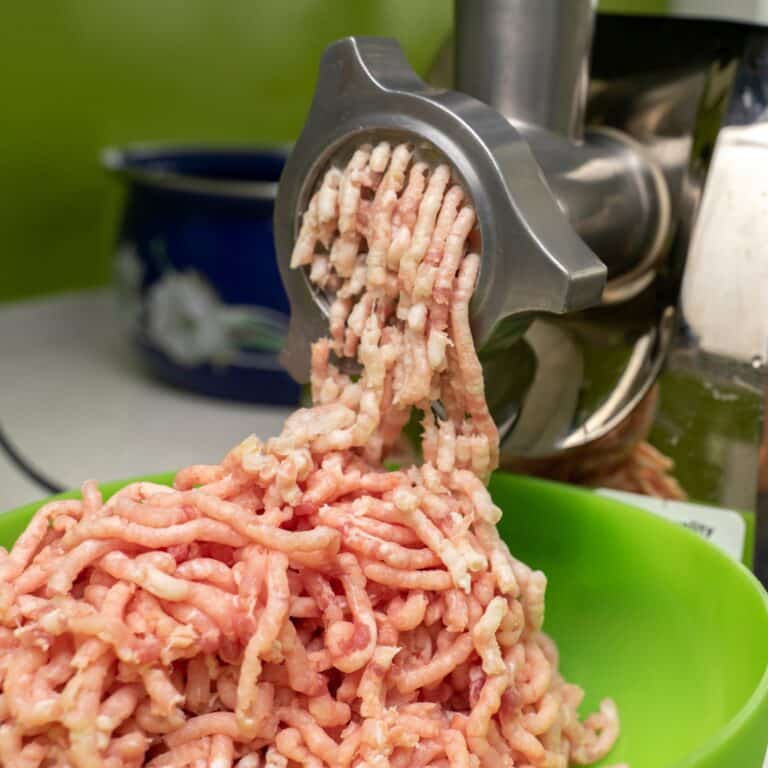Heart Healthy Lifestyle Changes For CKD
Living with chronic kidney disease (CKD) can be a challenge, but by making heart-healthy lifestyle changes you can improve your overall health and reduce the risk of further complications.
You may not realize this, but having chronic kidney disease puts you at a greater risk for heart disease. Most people with kidney disease don't reach end-stage renal disease, but die due to heart problems that can result from complications of the CKD.

Because of this, it is essential that you make lifestyle changes now to stay heart healthy and reduce your risk of heart disease. The following are some important changes to incorporate in your life to stay healthy!
Jump to:
- Key Takeaways
- What is CKD and How Does It Affect The Heart?
- Risk Factors
- Heart-Healthy Diet
- Sodium and Sugar Intake
- Home Cooking
- Exercise
- Smoking Cessation
- Stress Management
- Doctor Appointments
- Blood Work
- Blood Pressure Monitoring
- Sample Meal Plan
- FAQs for Heart Healthy Lifestyle Changes For CKD
- Kidney Health And Heart Health Go Hand-In-Hand
Key Takeaways
- Following a heart-healthy diet is crucial for CKD patients.
- Regular exercise helps lower blood pressure and manage weight, cholesterol, and glucose levels.
- Smoking increases the risk of heart attack and further kidney damage.
- Regular doctor appointments and monitoring of health levels are necessary.
For More Recipes and Ideas --->> Get Your Free Meals and Recipes That Are Perfect for Pre-Dialysis Diets, Pre-Dialysis with Diabetes, or Dialysis Diets.
What is CKD and How Does It Affect The Heart?
Chronic kidney disease is a long-term condition characterized by the gradual loss of kidney function over time. It is a progressive disease that often develops slowly and may go unnoticed in its early stages. CKD affects the kidneys' ability to filter waste products and excess fluids from the blood, leading to a buildup of toxins and fluid retention in the body.
There are various causes of CKD, including diabetes, high blood pressure, certain autoimmune diseases, kidney infections, and inherited conditions. There are five stages of kidney disease based on the severity of kidney damage and the estimated glomerular filtration rate (eGFR), which measures how well the kidneys filter waste from the blood.
CKD can have far-reaching effects on overall health, not just limited to the kidneys. One of the most significant complications associated with CKD is the increased risk of cardiovascular disease (CVD). The link between CKD and CVD is bidirectional, meaning that CKD increases the risk of developing CVD, and pre-existing CVD can further worsen kidney function.
The mechanisms underlying the relationship between CKD and CVD are multifactorial. As kidney function declines, various physiological changes occur in the body that contribute to cardiovascular complications. These include fluid overload, electrolyte imbalances, inflammation, oxidative stress, and endothelial dysfunction.
The presence of CKD itself is an independent risk factor for developing CVD, including conditions such as heart attacks, strokes, heart failure, and peripheral artery disease. Individuals with CKD have a higher likelihood of developing atherosclerosis, a buildup of fatty deposits in the arteries, which can restrict blood flow and lead to cardiovascular events. Additionally, CKD is associated with an increased risk of hypertension, abnormal lipid profiles, and insulin resistance, all of which contribute to the development of CVD.
Furthermore, CKD and CVD share common risk factors, such as diabetes, high blood pressure, obesity, cigarette smoking, and a sedentary lifestyle. These risk factors can exacerbate both conditions and create a vicious cycle of worsening kidney function and cardiovascular health.
To mitigate the risk of CVD in individuals with CKD, comprehensive management strategies are essential. These may include lifestyle modifications such as maintaining a healthy weight, adopting a balanced diet low in sodium and saturated fats, engaging in regular physical activity, and quitting smoking. Effective management of blood pressure, blood glucose levels, and lipid profiles through medication and regular monitoring is crucial.
In conclusion, chronic kidney disease is a progressive condition that affects kidney function and increases the risk of developing cardiovascular disease. The bidirectional relationship between CKD and CVD necessitates comprehensive management strategies to mitigate cardiovascular risks in individuals with CKD.
By addressing modifiable risk factors and implementing appropriate medical interventions, it is possible to reduce the burden of CVD and improve outcomes for individuals with CKD.

Risk Factors
Chronic kidney disease (CKD) and cardiovascular disease (CVD) share several common risk factors. Understanding these risk factors is crucial for identifying individuals who may be at higher risk and implementing preventive measures to reduce the incidence of both conditions.
- Diabetes: Diabetes is a significant risk factor for both CKD and CVD. Poor glycemic control in diabetes can damage the small blood vessels in the kidneys and impair their function. Similarly, uncontrolled diabetes can lead to the development of atherosclerosis, increasing the risk of CVD.
- High Blood Pressure: Hypertension is a leading cause of both CKD and CVD. Elevated blood pressure puts strain on the blood vessels and can damage the delicate filtering units in the kidneys. It also contributes to the development of atherosclerosis, increasing the risk of CVD.
- Obesity: Obesity is a risk factor for both CKD and CVD. Excess body weight increases the workload on the kidneys and can lead to the development of kidney damage. Obesity is also associated with hypertension, dyslipidemia, and insulin resistance, all of which increase the risk of CVD.
- Smoking: Smoking is a modifiable risk factor that significantly increases the risk of both CKD and CVD. Smoking damages blood vessels, decreases kidney function, and promotes atherosclerosis, making individuals more susceptible to developing both conditions.
- Family History: A family history of kidney disease or cardiovascular problems can increase the risk of developing CKD and CVD. Genetic factors can play a role in the susceptibility to these conditions, highlighting the importance of early screening and prevention in individuals with a family history.
- Age: Advancing age is a risk factor for both CKD and CVD. The risk of kidney damage and cardiovascular problems tends to increase with age due to cumulative exposure to risk factors, age-related changes in the body, and decreased kidney function.
- Ethnicity: Certain ethnic groups, such as African Americans, Hispanics, and Native Americans, have a higher prevalence of CKD and CV. Genetic factors, socioeconomic disparities, and differences in health behaviors contribute to these disparities.
- Other Medical Conditions: Several other medical conditions, such as autoimmune diseases (e.g., lupus), chronic infections (e.g., HIV), and certain kidney disorders (e.g., polycystic kidney disease), can increase the risk of both CKD and CVD.
- Sedentary Lifestyle and Poor Diet: Lack of physical activity and an unhealthy diet high in sodium, saturated fats, and processed foods contribute to the development of obesity, hypertension, diabetes, and dyslipidemia, all of which increase the risk of both CKD and CVD.
- Chronic Inflammation: Chronic inflammation, often seen in conditions like rheumatoid arthritis or chronic infections, can contribute to the development of both CKD and CVD.
Identifying and addressing these risk factors through lifestyle modifications (e.g., healthy diet, regular exercise, smoking cessation), blood pressure and blood sugar control, and appropriate medical management can help reduce the incidence of CKD and CVD. It is essential to raise awareness about these risk factors and promote preventive measures to improve overall health outcomes.
Heart-Healthy Diet
Making dietary modifications to your meal plans is a great way to support your kidneys and overall health. Heart-healthy eating plans include foods that are low in sodium and fat, high in fiber, and packed with vitamins and minerals. Nutritional guidelines should be tailored according to individual needs, including any medical conditions or food allergies.
| Low Sodium Options | Healthy Fats | Portion Control |
| Fresh fruits & veg | Olive Oil | Smaller portions |
| Whole grains | Avocado | Eat slowly |
| Lean proteins | Nuts/Seeds | Avoid snacking |
A heart-healthy diet is a way of eating that promotes cardiovascular health and helps reduce the risk of heart disease and other cardiovascular conditions. It focuses on consuming nutrient-dense foods that provide essential vitamins, minerals, and antioxidants while minimizing the intake of unhealthy fats, sodium, and added sugars.
A heart-healthy diet emphasizes the consumption of fruits, vegetables, whole grains, lean proteins, and healthy fats. These foods are rich in fiber, antioxidants, and essential nutrients that support heart health.
Fruits and vegetables provide vitamins and minerals, as well as dietary fiber that helps lower cholesterol levels. Whole grains, such as whole wheat, brown rice, and oats, are high in fiber and can help regulate blood pressure and improve heart health.
Lean proteins, such as skinless poultry, fish, legumes, and nuts, provide essential amino acids without the added saturated fats found in red meats. Healthy fats, like those found in avocados, nuts, seeds, and olive oil, can help lower cholesterol levels and reduce inflammation.
In a heart-healthy diet, it is important to limit the intake of saturated fats, trans fats, cholesterol, sodium, and added sugars. These can be found in foods like fatty meats, fried foods, processed snacks, sugary drinks, and desserts. Instead, it is recommended to choose healthier cooking methods like baking, grilling, or steaming, and opt for low-sodium seasonings and natural sweeteners when needed.
Adopting a heart-healthy diet is not just about individual food choices but also about overall eating patterns. Portion control, mindful eating, and regular physical activity are essential components of a heart-healthy lifestyle.
It is important to work with a healthcare professional or registered dietitian to develop a personalized meal plan that suits individual needs, taking into account any specific dietary restrictions or health conditions. By following a heart-healthy diet, individuals can improve their cardiovascular health, reduce the risk of heart disease, and promote overall well-being.
Sodium and Sugar Intake
Managing sodium and sugar intake is crucial for individuals with chronic kidney disease who are following a heart-healthy diet. Both sodium and sugar can have negative impacts on kidney health and cardiovascular health. Here are some strategies to effectively manage sodium and sugar intake:
- Sodium Management:
- Read food labels: Pay close attention to sodium content on food labels and choose low-sodium or no-added-salt options.
- Cook at home: Preparing meals at home allows for better control over sodium content. Use herbs, spices, and natural flavorings to enhance taste without relying on salt.
- Limit processed foods: Processed and packaged foods are often high in sodium. Opt for fresh, whole foods and limit the consumption of processed meats, canned goods, and packaged snacks.
- Rinse canned vegetables: If using canned vegetables, rinse them under water before consumption to reduce sodium content.
- Be cautious of condiments: Many condiments, such as soy sauce, ketchup, and salad dressings, are high in sodium. Look for low-sodium alternatives or make homemade versions using herbs, vinegar, and olive oil.
- Sugar Management:
- Reduce added sugars: Limit the consumption of sugary beverages, processed snacks, desserts, and sweets. Opt for water, unsweetened beverages, and fresh fruits as healthier alternatives.
- Read food labels: Check for hidden sources of added sugars in packaged foods. Ingredients such as corn syrup, fructose, sucrose, and dextrose indicate the presence of added sugars.
- Choose whole foods: Focus on whole fruits instead of fruit juices, which can be high in sugar and lack fiber. Opt for whole grains instead of refined grains that may contain added sugars.
- Be mindful of portion sizes: Even natural sugars found in fruits should be consumed in moderation. Pay attention to portion sizes to avoid excessive sugar intake.
- Gradual reduction: Gradually reduce sugar intake to allow taste buds to adjust. Over time, the preference for overly sweet foods will decrease.
It is important for individuals with CKD to work closely with a registered dietitian to develop a personalized meal plan that addresses their specific dietary needs, including sodium and sugar restrictions.
Regular monitoring of blood pressure, blood sugar levels, and kidney function, along with adherence to the recommended guidelines, can help individuals with CKD manage their condition effectively and support their cardiovascular health.
Home Cooking
Cooking at home is a great way to control your sodium and sugar intake while still enjoying delicious meals. Not only does it provide the opportunity to use fresh ingredients, but also allows for flexibility in creating healthy recipes that are tailored to individual needs. By taking into consideration the importance of portion sizes, preparation techniques, and seasonings, you can create meals that are both heart-healthy and flavorful.
| Benefits of Homemade Meals | Healthy Recipes |
| Controls salt & sugar intake | Create dishes tailored to individual needs |
| Use fresh ingredients | Consider portion size & spices in recipes |
| Flavorful | Utilize healthy cooking techniques |
Tips for meal planning include keeping a grocery list of items needed each week so you don't forget any essential items. It's also important to plan ahead by preparing large batches and freezing leftovers for future use. Utilizing herbs and spices instead of salt when seasoning dishes will not only give the food flavor without extra sodium but will add beneficial antioxidants as well.
The importance of using fresh ingredients cannot be overstated when it comes to heart health. Fresh fruits and vegetables are preferred since canned fruits and canned vegetables may have additives used as preservatives.
When combined with lean proteins such as tofu or fish, these types of meals can provide lasting energy throughout the day while providing necessary nutrients for improved kidney function.
Incorporating healthy cooking techniques such as baking or roasting foods without added fats helps minimize cholesterol intake while still delivering maximum flavor from natural seasonings like garlic or ginger root. As an added bonus, reducing unhealthy fats in your diet can also help reduce blood pressure levels over time leading to better kidney function and overall health benefits.
Making small changes towards a heart-healthy lifestyle is achievable with dedication and consistency; homemade meals are just one part of this journey towards improved wellbeing. With creativity in recipes along with mindful portion control, eating healthy doesn't have to be boring—it can even be enjoyable!
Exercise
Now it's time to move on to a very important lifestyle change for people with kidney disease: exercise. Exercise has many benefits and can be tailored to your individual needs. It is important for everyone, but especially those with chronic kidney disease, as regular physical activity helps improve blood pressure and manage weight, cholesterol, and glucose levels.
The types of exercise you should do depend on your current level of fitness, health status, and preferences. Generally speaking, aerobic activities like walking or cycling are recommended in addition to muscle-strengthening exercises such as lifting weights or doing push-ups or sit-ups.
It is important that you consult with your doctor before starting any new exercise program so that they can provide guidance and modifications that will be tolerable for you given your physical condition.
Exercise guidelines for people with kidney problems include aiming for at least 30 minutes of moderate intensity physical activity five days per week. Modifications may include reducing the intensity of the activity or taking more rest periods between sets if needed.
It is also beneficial for CKD patients to limit sodium intake before engaging in physical activity as excess fluid buildup can worsen symptoms associated with kidney failure, such as shortness of breath. Finally, make sure to listen to your body and take frequent breaks if needed during exercising; this will help prevent fatigue that can lead to injury or further complications related to kidney disease.
With all these changes taken into consideration, regular physical activity still plays an essential role in improving overall quality of life by helping maintain better heart health as well as reducing stress levels associated with chronic illness. To keep the heart healthy for individuals with chronic kidney disease, diet modifications coupled with exercise is key.
Smoking Cessation
Quitting smoking is an essential step to protecting your long-term health, particularly in regards to chronic kidney disease and heart health. Smoking increases the risk of heart attack and further damage to the kidneys, so it's important for people with kidney problems to stop smoking.
Here are some benefits of quitting smoking:
- Improved lung capacity
- Lower blood pressure
- Reduced risk of stroke and other cardiovascular diseases
Smoking cessation programs can provide support and assistance with quitting. Nicotine replacement therapy (NRT) products such as patches or gum may also be helpful. It's important for CKD patients to understand the dangers of smoking and how it affects their health before attempting to quit.
Tips for quitting include making a plan, finding support from family or friends, and avoiding triggers like alcohol or places where people smoke. By taking action now, people with kidney problems can reduce their chances of developing more serious complications related to heart disease later on.
Quitting smoking will not only protect your heart but also improve overall quality of life by reducing stress levels, increasing energy levels, and helping you breathe easier.

Stress Management
Managing stress is essential for CKD patients, as it can put strain on the body and lead to unhealthy habits. Stress can cause emotional and physical fatigue, which can worsen symptoms of kidney disease. It is important for CKD patients to develop effective stress management techniques to help reduce anxiety and improve overall well being.
Relaxation exercises, mindfulness practices, and other stress reduction strategies are helpful coping mechanisms that can be used to manage stress levels. Deep breathing exercises are an effective way to reduce tension in the body and mind by bringing more oxygen into the lungs.
Guided imagery is another relaxation exercise that can be used to imagine peaceful situations or pleasant scenes in order to reduce anxiety levels. Mindfulness practices such as meditation or yoga have been proven beneficial for calming the mind and reducing stress levels.
Physical activity can help alleviate feelings of stress by releasing endorphins which create a feeling of joy in the brain. Regular exercise helps maintain a healthy weight, reduces blood pressure, improves sleep patterns, boosts energy levels, and provides an outlet for pent up emotions or frustrations.
CKD patients should also seek out support from family members or friends when they feel overwhelmed with their condition. Talking openly about one's feelings can provide relief from anxiety while forming strong connections with people who understand what it's like living with chronic illness.
Learning coping mechanisms is essential for managing daily stressors that come with having kidney disease so that one may live a healthier life overall.
Doctor Appointments
Attending regular doctor appointments and monitoring health levels are crucial for CKD patients in order to maintain their wellbeing.
With the help of a health care provider, CKD patients can better understand their condition and create an effective treatment plan. During these appointments, it's important that doctors communicate with patients about their progress, any changes in symptoms, and treatments or medication options.
Follow-up care is also important to ensure that treatment plans are working properly and to make adjustments if necessary. CKD patients must be proactive in taking preventive measures such as lowering blood pressure, cholesterol, and glucose levels while managing weight through exercise and diet.
Regular doctor visits are key for monitoring these health parameters which can further protect the kidneys and heart from damage. Similarly, medication management may need frequent adjustment as kidney function decline occurs over time.
It is essential that CKD patients take charge of their own health by attending regular doctor appointments for follow-up care so they can receive accurate guidance regarding managing their condition.
This will help them stay informed on the best steps to take concerning lifestyle changes as well as understanding available treatment options. Working together with a health care provider ensures that CKD patients have access to the resources needed to live a healthy life with chronic kidney disease.
Blood Work
Now that you have a clearer understanding of the importance of doctor appointments, it's time to discuss another essential part of your health care: blood work. Blood tests are important tools for monitoring your kidney function and overall health condition. It can help identify abnormal levels in various parameters that could be a cause for concern and would require adjustments in your care plan.
| Test | Purpose | Frequency |
| GFR | Glomerular Filtration Rate - Measures kidney function | Annually or more often if necessary |
| Blood Urea Nitrogen (BUN) & Creatinine Levels | Measure waste in the blood from normal break down of food protein | Annually or more often if necessary |
| Phosphorus and Potassium Levels | Monitor mineral intake which affects bone health, heart rate, and muscle function |
Your health care provider may order additional tests to detect other problems related to kidney disease such as hypertension, dyslipidemia, hyperuricemia, or diabetes. Interpreting lab results can be difficult so make sure to talk with your health care provider about any questions you have about them. It's also important to follow-up appointments with your doctor and keep track of any changes in symptoms or health readings over time.
By staying up-to-date on your blood work, you can ensure that any issues are identified early on and addressed before they become serious. This gives you peace of mind knowing that all aspects of your health are being monitored closely and taken seriously. Taking steps towards protecting the heart should always include regular blood work as part of a comprehensive plan for good health.
Blood Pressure Monitoring
Monitoring your blood pressure is an essential part of keeping your overall health in check. Knowing and tracking your blood pressure readings can provide valuable insight into how effectively you're managing your chronic kidney disease.
Elevated blood pressure can be both a cause and an effect of chronic kidney disease, making it all the more important to keep your blood pressure in check.
Here are the benefits of tracking, monitoring techniques, importance of consistency, and lifestyle modifications to help you better manage blood pressure:
- Benefits of Tracking: By regularly checking your blood pressure, you can identify any abnormalities that may be caused by changes in diet or medication. It also allows for early detection of high or low readings, which can then be addressed with lifestyle modifications and/or adjustments to medication.
- Monitoring Techniques: Devices such as wrist monitors or upper arm cuffs are available for home use. Additionally, many pharmacies offer free blood pressure checks. Your doctor may recommend a 24-hour monitor if there is concern about fluctuations in readings throughout the day.
- Importance of Consistency: Once a routine has been established, it's important to stick with it so that abnormal readings can be identified more easily when they occur. Additionally, regular tracking helps ensure that lifestyle modifications are effective and that medications are working correctly.
- Lifestyle Modifications: Eating a heart-healthy diet low in sodium and saturated fats can help reduce high blood pressure, while exercising regularly keeps muscles strong and flexible, improving circulation. Quitting smoking also helps reduce the risk of cardiovascular complications associated with CKD.
- Blood Pressure Goals: A goal should be set with a healthcare provider specific to individual needs – usually 120/80 mm Hg or below depending on other conditions present – so progress towards lowering high readings can be measured accurately over time.
Sample Meal Plan
Here is a sample heart-healthy meal plan that incorporates the principles of a renal diet for individuals with kidney disease:
Breakfast:
- Egg white omelet with spinach, mushrooms, and low-sodium cheese
- Whole wheat toast with a small amount of avocado spread
- Fresh fruit salad (e.g., berries, melon) on the side
Snack:
- Greek yogurt with a sprinkle of chopped almonds or walnuts
Lunch:
- Grilled chicken breast with a squeeze of lemon juice
- Quinoa salad with cucumbers, cherry tomatoes, and fresh herbs
- Steamed asparagus spears
Snack:
- Sliced apples with a small portion of unsalted almond butter
Dinner:
- Baked salmon seasoned with herbs and lemon
- Brown rice pilaf with mixed vegetables (e.g., carrots, peas, bell peppers)
- Steamed broccoli with a drizzle of olive oil
Snack:
- Carrot sticks with a homemade hummus dip (made with low-sodium ingredients)
Note: It's important to keep portion sizes in mind and adjust them based on individual dietary needs and preferences. Fluid intake may need to be restricted for individuals with kidney disease, so it's essential to follow any prescribed fluid restrictions.
Remember to work closely with a registered dietitian or healthcare professional who specializes in kidney disease and heart health to tailor the meal plan to your specific needs. They can provide personalized guidance and ensure that the meal plan aligns with your renal and heart health goals while meeting your nutritional requirements. Regular monitoring of blood pressure, kidney function, and other relevant markers will also help guide any necessary adjustments to the meal plan.
FAQs for Heart Healthy Lifestyle Changes For CKD
In addition to dietary changes, other lifestyle changes can help reduce the risk of heart and kidney disease. Regular physical activity is essential, aiming for at least 150 minutes of moderate-intensity aerobic exercise per week.
Maintaining a healthy weight, managing stress levels, quitting smoking, and limiting alcohol consumption are also crucial. Monitoring and managing blood pressure and blood sugar levels, as well as cholesterol levels, through regular check-ups and appropriate medical management, are important.
Adequate hydration and following prescribed medications and treatment plans for any existing conditions are also vital. Finally, getting sufficient sleep and practicing good sleep hygiene contribute to overall cardiovascular and kidney health.
Consulting healthcare professionals, such as doctors, registered dietitians, and specialists, is recommended to develop a comprehensive plan tailored to individual needs and reduce the risk of heart and kidney disease.
Maintaining a healthy weight while managing kidney disease involves a combination of healthy eating, regular physical activity, and medical supervision. Work with a registered dietitian to develop a personalized meal plan that supports kidney health and helps manage weight. Focus on portion control, choosing nutrient-dense foods, and limiting sodium and added sugars.
Incorporate regular physical activity, such as walking or low-impact exercises, into your routine with guidance from your healthcare team. Regular monitoring of kidney function, blood pressure, and weight is important to track progress and make any necessary adjustments. Consult with your healthcare professional for specific recommendations based on your individual needs and medical condition.
Stress can have a major impact on your physical and emotional health. To reduce stress levels, it's important to find healthy ways to relax and cope with life's challenges.
Some helpful activities include meditation techniques, relaxation exercises, healthy dieting, physical activity, and emotional support. Regular exercise can help reduce stress hormones while also releasing endorphins in the brain which make you feel happier. Eating a balanced diet rich in vitamins and minerals provides a steady supply of energy throughout the day.
Finally, developing strong relationships with friends and family can provide uplifting emotional support when needed. All of these activities will work together to help lower your stress levels and improve your overall well being.
The frequency of blood pressure checks depends on various factors, including your current blood pressure levels, overall health, and any existing conditions. In general, it is recommended to have your blood pressure checked at least once every two years if your blood pressure is within the normal range (less than 120/80 mmHg).
If you have high blood pressure (hypertension) or other risk factors for cardiovascular disease, more frequent monitoring may be necessary, such as every few months or as advised by your healthcare professional. It's important to follow the guidance of your healthcare provider to determine the appropriate frequency for blood pressure checks based on your individual circumstances (grilling blood pressure).
If you have chronic kidney disease, there are several steps you can take to monitor your heart health. First and foremost, it is important to have regular check-ups with your healthcare provider. They will assess your blood pressure, cholesterol levels, and other relevant markers.
Additionally, they may recommend electrocardiograms (EKGs), echocardiograms, or other cardiac tests to evaluate heart function. Adhering to a heart-healthy diet, managing sodium and sugar intake, engaging in regular physical activity, and maintaining a healthy weight are crucial. It is also essential to follow prescribed medications, monitor fluid intake if necessary, and promptly report any new symptoms or concerns to your healthcare team.
Kidney Health And Heart Health Go Hand-In-Hand
Living with chronic kidney disease requires making heart-healthy lifestyle changes to reduce the risk of complications. CKD patients are at a greater risk of heart disease, which makes it crucial to adopt healthy habits.
Following a heart-healthy diet, engaging in regular exercise, quitting smoking, managing stress, and monitoring blood pressure are key components of a heart-healthy lifestyle for individuals with CKD.
Regular doctor appointments and blood work help monitor kidney function and overall health. Managing sodium and sugar intake is vital, and portion control plays a significant role in maintaining a healthy weight.
By incorporating these lifestyle changes and working closely with healthcare professionals, individuals with CKD can reduce the risk of heart and kidney disease, improve overall health, and enhance their quality of life (smart goals for chronic kidney disease).












